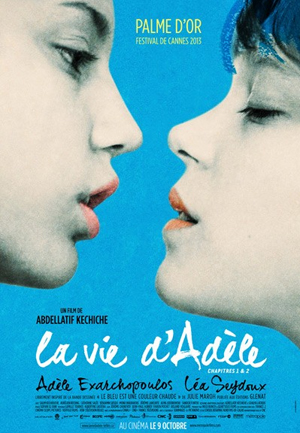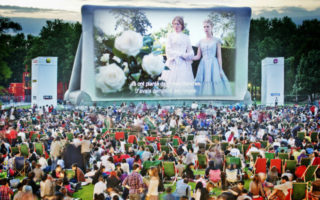La Vie d’Adele (Blue Is the Warmest Color): Sentimental Sex Education
- SUBSCRIBE
- ALREADY SUBSCRIBED?
BECOME A BONJOUR PARIS MEMBER
Gain full access to our collection of over 5,000 articles and bring the City of Light into your life. Just 60 USD per year.
Find out why you should become a member here.
Sign in
Fill in your credentials below.
Blue is the Warmest Color is receiving more attention (and stirring up more controversy) than any French film since The Artist. The title’s translation is odd, even if it sounds nice. The French title stresses the protagonist’s character and life arc, and also alludes to a classic novel, La Vie de Marianne (by Marivaux), mentioned in the movie. It illustrates Adele’s literary side, and how her story is another iteration of a French archetype. The US title lays emphasis on the object of Adele’s affections—what’s literally blue in the movie is her lover’s hair. (Why do I suspect a remake in the offing?)
We follow Adele (played by Adele Exarchopoulos) from lycée to student life and then to her career as a primary school teacher. The film is a bildungsroman, or story of a youth’s education, which never leaves the world of schooling. It’s also the story of Adele’s sentimental education. This starts conventionally with a boy who’s nice but leaves her unsatisfied. She then has a friendship with another boy, who may be gay. When they visit a gay bar she notices Emma (Léa Seydoux), an artist a few years older than her. A meeting is contrived, and from that moment Adele’s life changes.
Adele explores her sexuality, but also moves beyond her family’s limited bounds, discovers the society of artists, pursues her own professional path. The problem is that her new life is dependent on one person. She can’t help realizing this even as she remains in thrall. It’s maybe why she continues to experiment with men, leading to a rocky situation with Emma. It’s hardly an original premise, but the characters seem utterly real, and are impressively inhabited by the two leads.
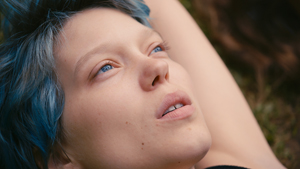 Adele Exarchopoulos is a sweet young thing with doe-like eyes and a babyfat-is-beautiful face and body (she may single-handedly put teenage anorexia out of fashion), but is also a natural actress. She’s complemented perfectly by Léa Seydoux, a creamy beauty who looks like a slightly butched-out Uma Thurman. What’s attractive about her is her cool, accentuated by that hair (which isn’t warm at all). Seydoux’s crafted acting style corresponds well to the mature personality Adele is drawn to, in addition to her body.
Adele Exarchopoulos is a sweet young thing with doe-like eyes and a babyfat-is-beautiful face and body (she may single-handedly put teenage anorexia out of fashion), but is also a natural actress. She’s complemented perfectly by Léa Seydoux, a creamy beauty who looks like a slightly butched-out Uma Thurman. What’s attractive about her is her cool, accentuated by that hair (which isn’t warm at all). Seydoux’s crafted acting style corresponds well to the mature personality Adele is drawn to, in addition to her body.
The director, Abellatif Kechiche, shoots in a direct style that sometimes verges on cinema verité, with lots of close-ups and jagged compositions. Kechiche also likes to drag out scenes, a technique that irritates spectators, but gives us the impression we’re in the middle of real life, in real time.
Blue movingly depicts an imperfect young woman asserting her freedom in the face of external norms, beginning with the stupidities of high school society. More interesting is how French education is portrayed as both enriching and stultifying. (Ironically Adele becomes a schoolteacher who both stimulates and controls her charges.) Her lower-middle class family also stifles her desire for new things—they seem to eat spaghetti at every meal. Emma’s more cultivated family is limiting as well, and Adele winds up feeling uncomfortable with her lover’s artsy success ethic. The director trenchantly reminds us that the word bobo is derived from both bohemian and bourgeois.
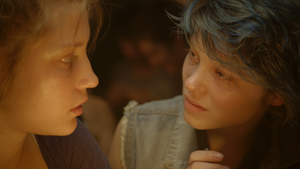 Kechiche achieved renown with L’Esquive, one of those high-minded feel-good movies showing young people in harsh environments uplifted by French culture. In L’Esquive, lower-class youths rehearse a play by Marivaux. Adele too is awakened to her potential thanks to intellectualized culture. The director’s artistic, as opposed to intellectual, side shows that culture can also hold people back, that lived experience is more valuable than abstraction. Kechiche is of Tunisian origin, and his dual culture is perhaps what gives him this double focus.
Kechiche achieved renown with L’Esquive, one of those high-minded feel-good movies showing young people in harsh environments uplifted by French culture. In L’Esquive, lower-class youths rehearse a play by Marivaux. Adele too is awakened to her potential thanks to intellectualized culture. The director’s artistic, as opposed to intellectual, side shows that culture can also hold people back, that lived experience is more valuable than abstraction. Kechiche is of Tunisian origin, and his dual culture is perhaps what gives him this double focus.
Are the much talked-about sex scenes gratuitous? Not completely. Adele is sexually in love with another woman—not just emotionally in love or psychologically obsessed—so it’s necessary to show the rapture she feels with Emma. But going to such explicit lengths is more a matter of commerce than art. At least the sex is between real persons in a real relationship, unlike the couplings in Jeune et Jolie. Still, the idea of very young women (Exarchopoulos is all of 20) performing on screen in exchange for movie success is as creepy as any other form of exploitation, from casting couch to release of sex tapes to rebranding via twerking.
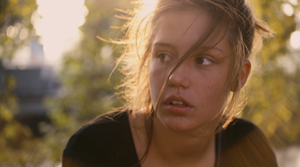 For a film being taken by some as groundbreaking, Blue’s depiction of sexual attitudes seems dated. The schoolyard gay-baiting isn’t plausible these days. French lycéens tend to support gay marriage and attend gay pride marches. Even the in-your-face gay bar scenes seem corny, as if same-sex smooching was still shocking. What really shocks is the protagonist’s inability to get over her first love. We wonder if she actually enjoys being emotionally bereft, something more evocative of German romanticism (or Billie Holiday) than French worldliness. Maybe for Adele blue really is the warmest color.
For a film being taken by some as groundbreaking, Blue’s depiction of sexual attitudes seems dated. The schoolyard gay-baiting isn’t plausible these days. French lycéens tend to support gay marriage and attend gay pride marches. Even the in-your-face gay bar scenes seem corny, as if same-sex smooching was still shocking. What really shocks is the protagonist’s inability to get over her first love. We wonder if she actually enjoys being emotionally bereft, something more evocative of German romanticism (or Billie Holiday) than French worldliness. Maybe for Adele blue really is the warmest color.
Production: Quat’sous Films/Wild Bunch/France 2 Cinéma
Distribution: Sundance Selects (US)
More in film review, French film, gay-themed film, sex
